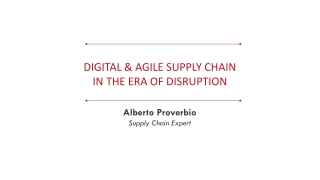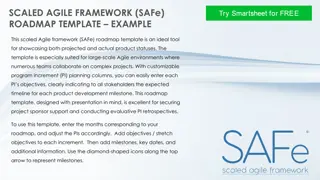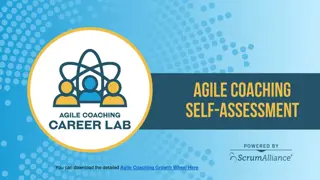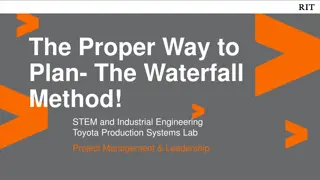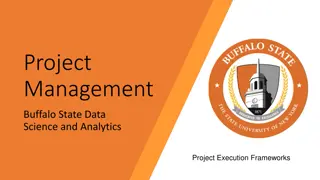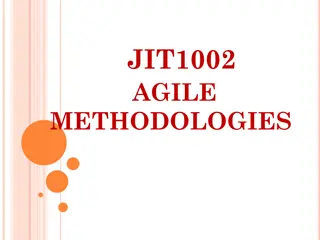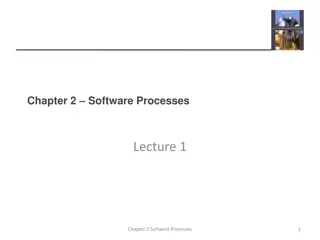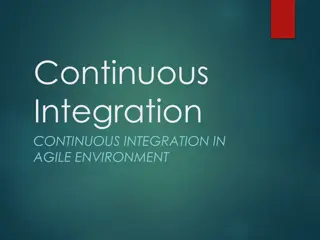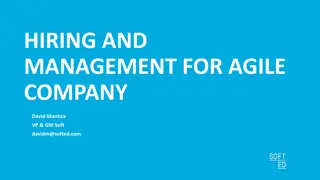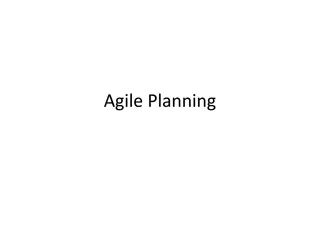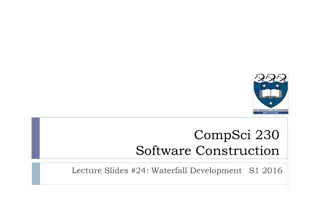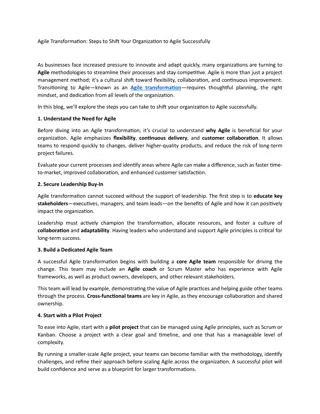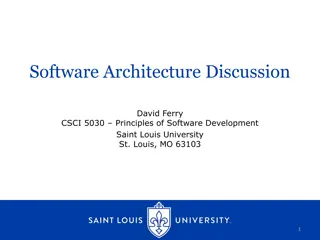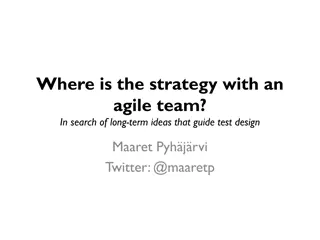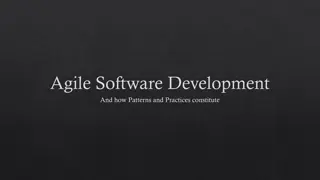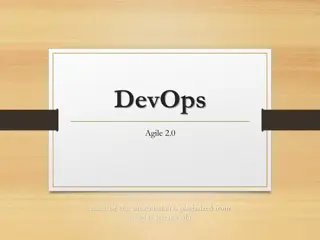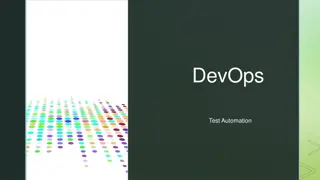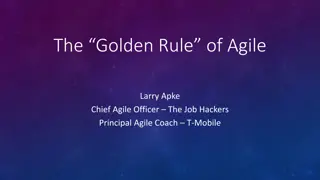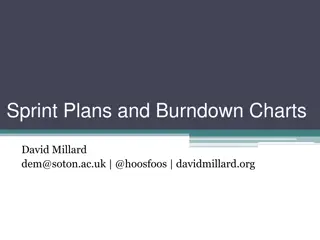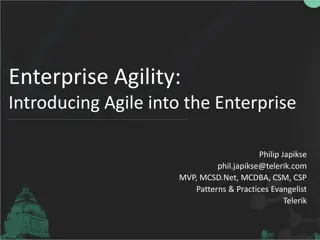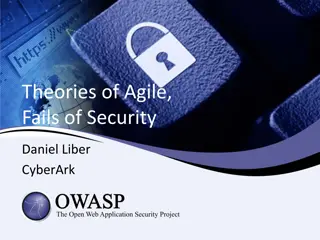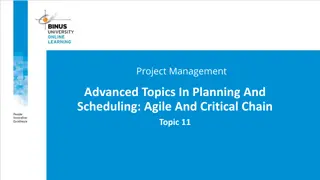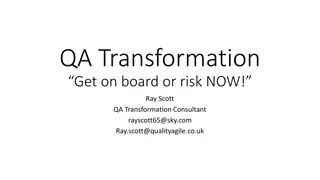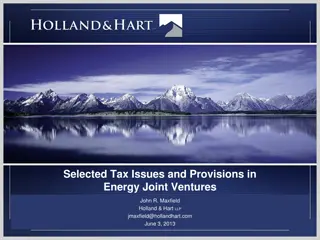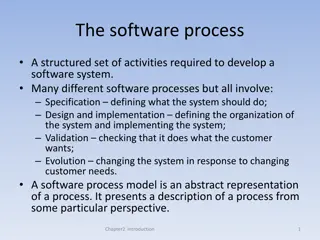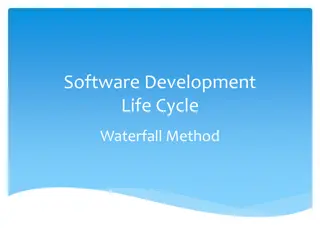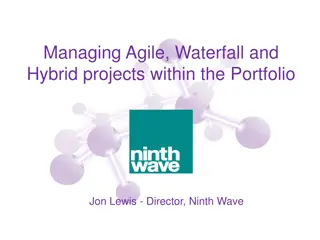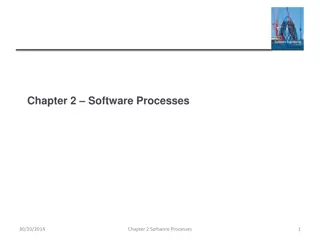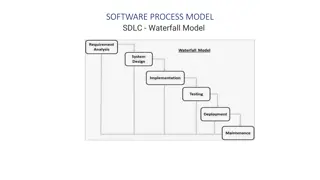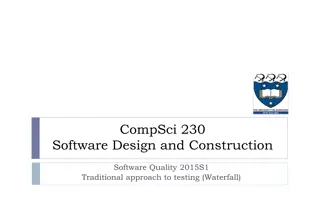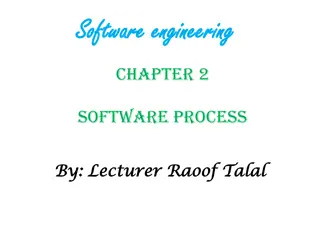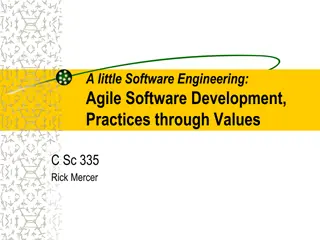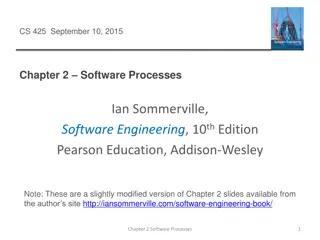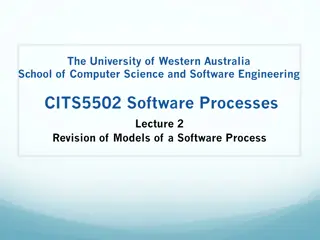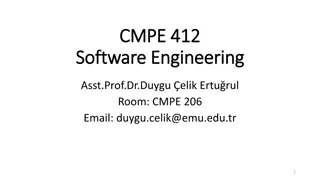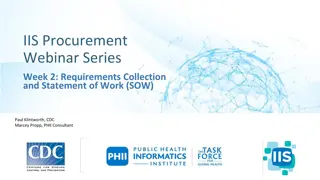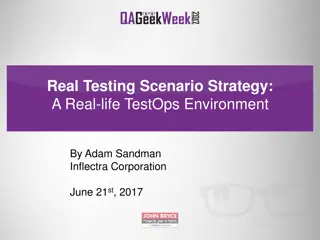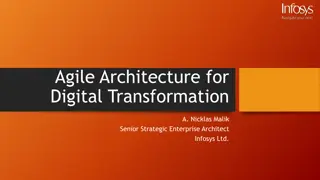Digital & Agile Supply Chain in the Era of Disruption
Managing global supply chains has become increasingly difficult in the age of disruption. This article explores the challenges organizations face and presents agile and resilient supply chain models enabled by digital technology.
2 views • 11 slides
Feature-Based Agile Product Roadmap Template
Keep track of all planned product features with this comprehensive roadmap. Instantly gain insight into each feature and its duration, allowing for customization to timebox sprint periods for Agile development. Ideal for PI planning to prioritize key features effectively.
2 views • 6 slides
Scaled Agile Framework (SAFe) Roadmap Template Example
This Scaled Agile Framework (SAFe) roadmap template is a valuable tool for showcasing projected and actual product statuses in large-scale Agile environments. It allows for clear communication of program increment objectives, milestones, and key dates, facilitating stakeholder alignment and supporti
1 views • 4 slides
Understanding Agile Coaching Competencies and Growth Wheel
Explore the detailed Agile Coaching Growth Wheel, assessing competency areas like Self-Mastery, Serving the Business, Team, Org Change, and more. Dive into competencies such as Coaching, Leading, and Facilitating, crucial for guiding sustainable change and developing individuals and teams. Enhance y
0 views • 12 slides
Understanding the Waterfall Method in Project Planning
Exploring the Waterfall Method of planning through a series of visuals and explanations, highlighting its importance in efficiently organizing tasks for both big and small projects. The content emphasizes practical examples of planning in everyday life, from school schedules to parents managing hous
0 views • 17 slides
Agile Project Management Frameworks Overview
Explore the Agile project management paradigm focusing on customer satisfaction through early and continuous delivery. Learn about Agile frameworks like Scrum and Kanban, emphasizing the breakdown of projects into manageable sprints for effective execution and delivery.
0 views • 21 slides
Agile Methodologies: Understanding, Applying, and Improving Software Development Processes
Explore the world of Agile methodologies in software development, covering basic concepts, various methodologies, testing principles, and quality assurance. Dive into Agile practices, project management, metrics, and global development. Recommended textbooks and references provided for in-depth lear
0 views • 33 slides
Understanding Software Processes and Models
Software processes are structured activities essential for software system development, involving specification, design, validation, and evolution. Various process models and approaches like the Rational Unified Process and agile methods are discussed, highlighting the importance of adaptability in
1 views • 105 slides
Understanding Continuous Integration and Agile Methodologies
Continuous Integration involves frequent integration of team members' work to detect errors quickly, leading to cohesive software development. Agile methodologies emphasize adaptive planning, collaboration, and responsiveness to change, minimizing the risk of irrelevance in a changing world. The Agi
0 views • 22 slides
Hiring and Management for Agile Company Overview
This overview delves into the crucial aspects of hiring and managing talent for an agile company, emphasizing the skills, principles, and strategies required for success in an agile work environment. It covers topics such as critical professional and business skills, hiring models, agile leadership
0 views • 26 slides
Understanding Agile User Stories in Software Development
Agile user stories play a crucial role in software development by providing short descriptions of features desired by customers in a language they understand. This method allows for agile planning, efficient documentation, and effective communication between development teams and clients. Extracting
0 views • 30 slides
Waterfall Model in Software Development: Explained
The Waterfall model, dating back to 1968, depicts software development as a linear multi-stage process where each stage must be completed before moving to the next. This structured approach involves stages like decision-making, design, development, testing, and implementation. Despite its benefits s
0 views • 9 slides
Agile Transformation Steps to Shift Your Organization to Agile Successfully
As businesses face increased pressure to innovate and adapt quickly, many organizations are turning to Agile methodologies to streamline their processes and stay competitive. Agile is more than just a project management method; it's a cultural shift
0 views • 3 slides
Examining the Intersection of Software Architecture and Agile Philosophy
Explore the potential conflicts and synergies between software architecture and agile philosophy, addressing concerns such as the devaluation of architectural efforts, balancing development speed with technical debt, and the complementary roles of agile principles and architectural practices in prom
0 views • 14 slides
Strategies for Long-Term Test Design with Agile Teams
Exploring strategies for guiding test design with agile teams, focusing on long-term ideas and insights shared by Maaret Pyhäjärvi. Topics covered include testing in agile teams, aligning testing with product development, and key observations from real-world experiences. Emphasis is placed on cont
0 views • 6 slides
Agile Software Development: Patterns, Practices, and Real-Life Applications
Exploring the significance of Agile Software Development, focusing on writing SOLID code, Framework Design Guidelines, Design Patterns, and best practices. Discover the why and what behind Agile methodologies, with insights on their real-world applications.
0 views • 44 slides
Insights into DevOps and Agile 2.0 Practices in Software Development
This presentation discusses the integration of DevOps and Agile 2.0 methodologies in software development, focusing on topics such as plagiarism concerns, challenges faced by developers, important tools and technology investments, collaborative environments, and the concept of Dev.v.Ops. It explores
0 views • 18 slides
Comprehensive Overview of DevOps, Waterfall, and Agile Development Methods
This content provides detailed insights into DevOps, Waterfall, and Agile development methodologies, their goals, the need for DevOps, continuous testing, automated testing examples, CI/CD pipelines, integration testing, and more. It covers various aspects such as DevOps goals, continuous testing be
0 views • 16 slides
The Golden Rule of Agile and Time Management
The content highlights the importance of delivering optimal value to customers in the shortest time possible in Agile methodology. It discusses the significance of assessing both time and value early on to determine work sequences effectively. Additionally, it emphasizes the correct understanding an
0 views • 10 slides
Sprint Plans and Burndown Charts for Effective Agile Development
This content provides valuable insights into sprint planning, agile development, and SCRUM methodology. It emphasizes the importance of creating a brief with a business description and sprint plan, focusing on key elements such as business goals, task allocations, and team organization. The agile pr
0 views • 23 slides
Agile Practices in Enterprise: A Comprehensive Overview
Explore the world of Agile methodologies in the enterprise environment through topics like introducing Agile practices, the Agile Manifesto, different Agile flavors like Scrum and eXtreme Programming, roles within Agile teams, and the concept of iterations/sprints. Learn about the key principles and
0 views • 40 slides
Agile Security Practices and Collaboration Insights
This presentation delves into the intersection of Agile methodologies and security practices, highlighting the importance of predicting and preventing bottlenecks. With a focus on agile-security collaboration, the talk emphasizes the need to balance risks, enhance visibility, and foster collaboratio
0 views • 26 slides
Advanced Topics in Agile Project Management: Planning and Scheduling
Explore the nuances of Agile Project Management, Extreme Programming, Theory of Constraints, and Critical Chain scheduling techniques. Learn how Agile PM embraces flexibility and evolving customer needs, contrasting with the structured Waterfall model. Discover the key features and benefits of Agile
0 views • 33 slides
Insights into Agile, Testing, and QA Transformation
Uncover a wealth of knowledge from an experienced Sr. QA Manager & Agile Director, featuring topics such as Agile myths, software testing practices, defect management costs, off-shoring trends, and the importance of pushing left in development. Explore the challenges and strategies in QA transformat
0 views • 41 slides
Tax Issues and Provisions in Energy Joint Ventures
Partnership hallmarks in energy joint ventures offer opportunities for sophisticated practitioners but pose risks for novices. Key aspects include the distribution waterfall, distributable cash, and tax distributions in advancing on waterfall distributions to avoid owners having to pay taxes out of
0 views • 36 slides
Waterfall vs. Agile: A Comprehensive Comparison of Software Development Methodologies
Explore the differences between Waterfall and Agile methodologies in software development. Learn about their processes, advantages, disadvantages, and suitable application scenarios. Gain insights into how each approach tackles project management, team collaboration, responsiveness to changes, and p
0 views • 6 slides
Understanding Software Process Models
Software process models encompass various activities like specification, design, validation, and evolution involved in developing a software system. This includes plan-driven and agile processes, as well as models like the waterfall model and reuse-oriented software engineering. Embracing elements f
0 views • 7 slides
Understanding the Waterfall Software Development Life Cycle
Waterfall Method is a classic approach to the Systems Development Life Cycle, with linear and sequential phases. It emphasizes clear initial requirements, strict phase order, and early fault detection but lacks flexibility for revision and user involvement until the testing stage. Toyota is an examp
0 views • 11 slides
Managing Agile, Waterfall, and Hybrid Projects within the Portfolio by Jon Lewis
Introducing agile management techniques alongside traditional waterfall planning is crucial for handling a mix of waterfall, Agile, and hybrid projects within a project portfolio. This presentation by Jon Lewis, Director of Ninth Wave, explores the challenges and strategies for managing different pr
0 views • 27 slides
Overview of Software Processes and Models
This content delves into the fundamental aspects of software processes, discussing the structured activities involved in developing a software system, various process models, and the distinction between plan-driven and agile approaches. It emphasizes the importance of specification, design, validati
0 views • 37 slides
Understanding the Waterfall Model in Software Development
The Waterfall Model is a linear-sequential life cycle model for software development. In this model, each phase must be completed before the next can begin, without overlaps. The sequential phases include Requirement Gathering, System Design, Implementation, Integration and Testing, Deployment, and
0 views • 7 slides
Overview of Waterfall Model in Software Quality
Understanding the traditional approach to testing in software development, the Waterfall model involves staged development with each stage signed off before the next begins. Verification is crucial at each stage to ensure the product is being built correctly.
0 views • 24 slides
Understanding the Waterfall Model in Software Engineering
The Waterfall Model in software engineering follows a sequential process involving stages like requirements analysis, system design, implementation, integration, and maintenance. Each stage is crucial for successful software development, ensuring that the final product meets the specified requiremen
0 views • 20 slides
Agile Software Development: Practices and Values
Agile software development emphasizes customer involvement, teamwork, and high-quality software production. Contrasting with the waterfall model, agile practices promote adaptability and iterative approaches to project completion, highlighting the importance of delivering value efficiently and effec
0 views • 41 slides
Understanding Software Processes in Software Engineering
Exploring software processes, this content delves into topics like software process models, process activities, handling change, and process improvement. It discusses the structured set of activities involved in developing a software system, various process descriptions, plan-driven versus agile pro
0 views • 58 slides
Overview of Software Process Models and Prototyping Paradigm
This document discusses different models of software processes, including Waterfall, Prototyping, and Agile paradigms. It covers key concepts, levels of abstraction, 12 activities in every software project, and the phases of the Waterfall model. Additionally, it explores the Prototyping Paradigm and
0 views • 15 slides
Understanding Software Development Life Cycle (SDLC)
Explore the intricacies of Software Development Life Cycle (SDLC) through models like Waterfall and V-Shaped. Learn about the stages of SDLC, strengths and deficiencies of the Waterfall model, and when to use it in software projects.
0 views • 47 slides
Effective Requirements Collection for Successful Procurement
Efficiently collecting and articulating requirements is crucial in the procurement process. Clear, measurable, and strategic requirements help ensure successful acquisition planning and project delivery. This involves describing system functionalities, considering unique jurisdictional requirements,
0 views • 16 slides
Real Testing Scenario Strategy in a TestOps Environment
Learn about testing tiers, tools for testing challenges, sample architecture for web-based applications, and explore the agenda covering requirements, manual/unit/UI/load/API testing, CI server integration, and reporting. Understand the importance of defining requirements and developing a test strat
0 views • 26 slides
Understanding Digital Transformation and Agile Architecture
Digital Transformation involves reorienting traditional business models to embrace new technologies and meet customer expectations. It is a strategic effort crucial for organizations aiming to stay competitive in the digital era. Agile Architecture complements this transformation by integrating agil
0 views • 15 slides
